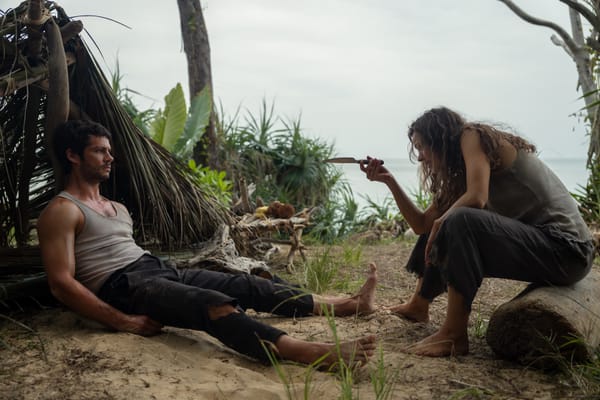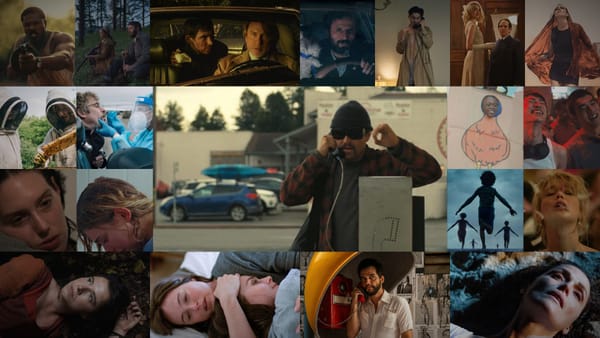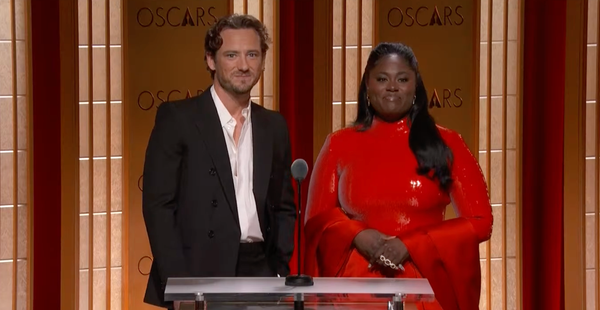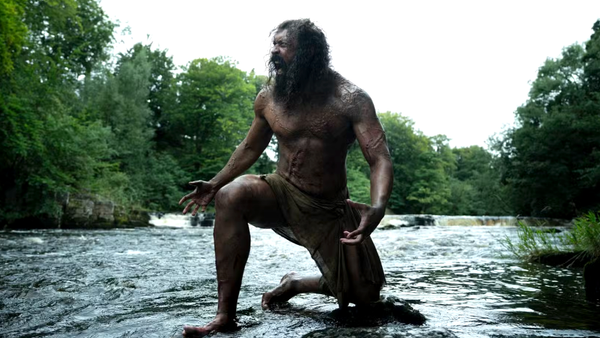One Year Ago, The Daniels Told Me About Overcoming Generational Trauma
Looking back on my interview with the Academy Award-winning directors.
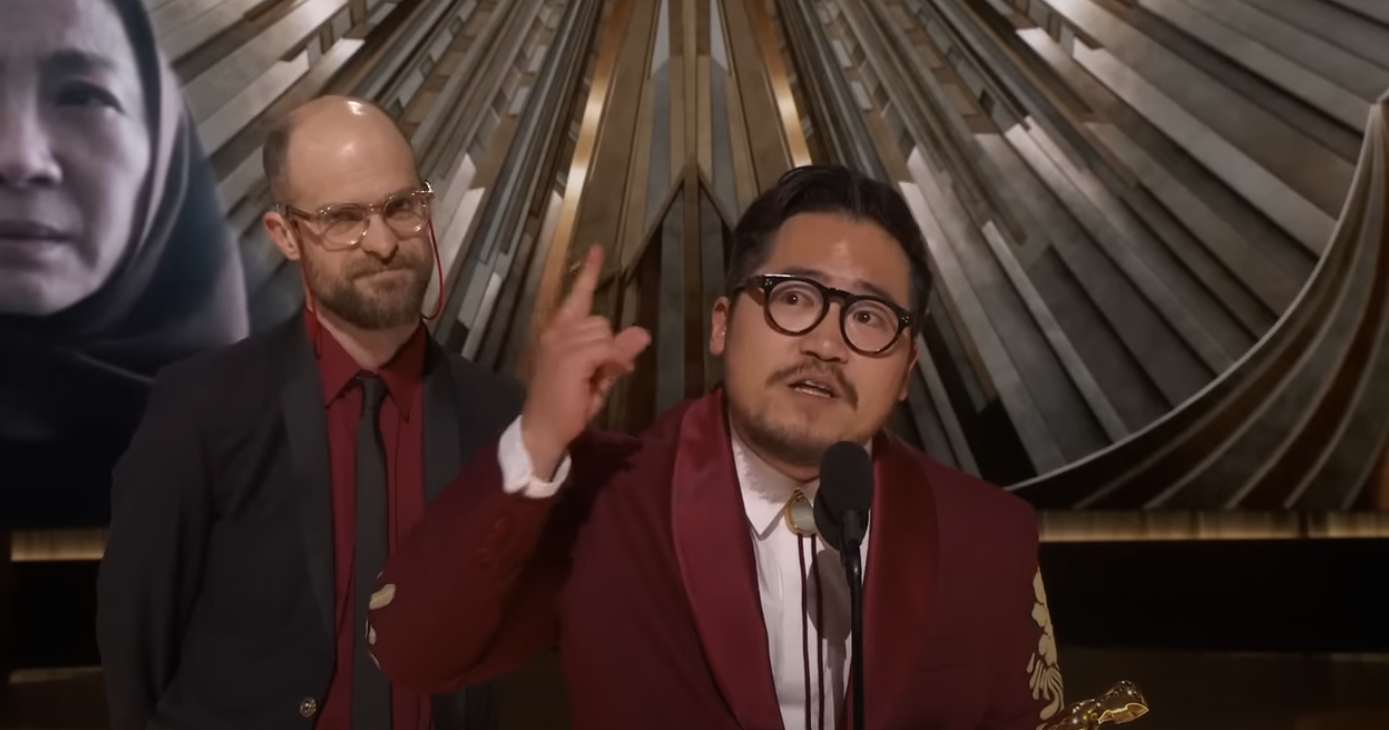
Watching Everything Everywhere All At Once (EEAAO) sweep the Oscars this year was moving. EEAAO was a movie that was distinctly about the Asian-American immigrant experience and to see it get honored in such a huge way was incredible. I loved the story behind how the Daniels (Daniel Kwan and Daniel Scheinert) put the film together as well as the message that it’s trying to send. I reflected on the Daniels’ acceptance speech in the below clip (you can also watch it on Tiktok).
The Daniels’ massive victory at the Oscars also has me remembering the time I had a chatted with them about EEAAO. In April 2022, shortly after the movie came out, I interviewed the Daniels for my podcast Culturally Relevant (currently on hiatus, but I expect it to return this year). We discussed how exactly it is the Daniels came to know me, how it captures the Asian-American immigrant experience, how they put together such a meticulously edited film, the visual effects workflow for EEAAO, advice for beginners looking to get into filmmaking, the importance of overcoming generational trauma, and a lot more!
As a fun bonus for newsletter subscribers, and to preserve things for posterity, I transcribed the conversation and am sharing it with you below. This interview has been edited for content and clarity. You can listen to the conversation here (due to the editing, not all portions will exactly match what you hear). I hope you enjoy the conversation and if you do, please consider giving this newsletter a subscribe/share!
David Chen: I have come to understand that the Filmcast, which is a podcast that I host, was one of the first film podcasts you ever listened to. Is that correct?
Daniel Kwan: Yes, I was in college. I was interning at Dreamworks Animation, and I had a lot of mindless tasks to do, and I discovered Slashfilm and the podcast, and I just started to just listen to every single episode for basically a whole semester.
Daniel Scheinert: Our first music video is called Underwear, and it's like, it's a ton of visual effects as people just dance alone. And Dan was doing that one, a lot of mindless visual effects on that one that summer.
Kwan: Right, yeah. But the thing that really stuck out to me was actually, I'm pretty sure, correct me if I'm wrong, but David, I'm pretty sure you were the one who was really hitting the drum, beating the drum for How to Train Your Dragon at the time. Is that right?
That is correct, yeah.
Kwan: And I was a new intern there, and right when I got there, they gave us a free screening of How To Train Your Dragon, and I was like, “Okay, we'll see what this movie's about.” And I remember just being blown away by it and being so surprised, and like, “This is amazing.” And when I heard you kind of just sing its praises, I felt very validated. I was like, “I like this guy, I'm going to keep listening to these people and see what I learn.” So yes, it was very formative for me.
Well, I'm super glad that you found the podcast as a way to do other mindless tasks. That's like the perfect fit for the podcast. I wanted to ask you, what makes for a good movie podcast, and also follow-up question, why was mine the best?
Kwan: Good question. Good question. I'd say the reason why yours was the best was all the Rian Johnson playing the banjo every episode and mostly just, I loved how much everyone hated Rian Johnson playing the banjo, and it just made me want him more on the podcast.
Rian Johnson had this thing where, before he was a Star Wars filmmaker, he would appear on the podcast and his objective was, every single time he appeared on the podcast, to be increasingly more and more in a situation where he shouldn't have been on the podcast. So one time he was playing banjo, one time he had a drink and [would clink the ice cubes] really, really loudly every single time before he spoke. And he said he wanted to do this thing where gradually, throughout the episode, it became clear he was at an amusement park, but that one never happened.
Kwan: That's great. Now I feel like we're being so boring just sitting here talking into a mic.
Scheinert: I know.
You guys are crushing it. So, tell us about what inspired you to make Everything Everywhere All at Once.
Kwan: There were two things that kind of collided. First of all, we are maximalist filmmakers. We have way too many ideas. I actually discovered, I had ADHD and was diagnosed while writing this movie. And so, it's impossible for us to pick one idea for a movie because we know it's going to take years of our lives. So that's one factor. And then the other side of the coin was, we were just like everyone else, waking up to the fact that life was becoming more and more chaotic.
Scheinert: We started writing it in 2016, when the internet started to visibly destroy American democracy, and it was kind a of scary time. And we were like, "Whoa, everyone's living in their own little worlds. What do you do about that?"
Kwan: Yeah. All these narratives were colliding and people were, when you could scroll through your feed and you'd see really upsetting news about something Donald Trump said, and then you'd just keep scrolling, and then you'd see a really dumb Pepe the Frog meme, and then you keep scrolling, and then you see some...
Scheinert: Awesome cat video, or some profound philosopher blowing your mind...
Kwan: So this movie was a reaction to that experience in saying, "What if we can figure out how to exist in that noise by writing a film about that?" And we set out to make this movie, not knowing what our conclusion would be. It's been a really rewarding, rewarding journey and healing for us in a way that I hope that other people who watch the movie can experience what we've experienced because of this film.
Scheinert: Although, now that we're promoting the movie, we're spending too much time on the internet and we're becoming broken men again.
Kwan: Yeah, exactly. Yeah.
Nice. I'm glad it all came full circle. I assume somebody has, during your many interviews, somebody has brought up Bo Burnham's Inside. Have you guys seen that?
Kwan: Huge fan. Yeah. Yeah.
Well, so [there’s a song called] “Welcome to the Internet,” and it kind of captures the fragmented nature of what it's like to experience the internet these days.
Kwan: Totally. Yeah. Yeah. I remember watching that special and being like, “This is such a unique moment for storytellers.” The fact that one person could create all of this on their own in their bedroom and tap into... Everything that we were trying to work on, except for he was able to do it with a lot less money, a lot less time, and put it out faster than we could. I was like, "Oh, okay, this..."
Scheinert: And all it took was a few public mental breakdowns.
Kwan: Exactly. Yeah, yeah, yeah.
And a Panasonic GH5.
Kwan: Exactly, yes. Yeah, it's a real revolution.
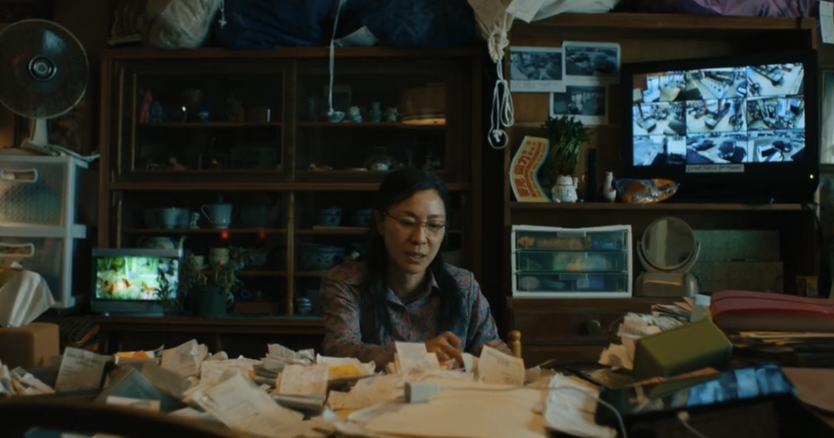
So I was instantly in love with this film right from the opening because I grew up as a Taiwanese American immigrant and my parents owned a Chinese restaurant. The protagonist of the film have a laundromat. The film captures the set dressing component of owning an immigrant business extremely well. There's just stuff everywhere. Every possible shelving unit is used to store something. Every space is occupied with objects. Can you talk a little bit about how you tried to capture that milieu?
Kwan: Yeah, I love that when other Asian Americans see this film and either feel seen because of the production design, or feel triggered depending on where you are. And yeah, my father's side of the family, they owned a bunch of laundromats in New York, and then my mom's side of the family, actually, now they're running a bunch of restaurants. So this was very much the world I grew up in, and we knew we wanted to make a movie about how overwhelming the world was, and we wanted to allow the space to visually represent that and swallow our character up in every frame before she even got to the multiverse in a really fun way. And it just so happened that I had a bunch of old pictures of my grandparents' apartments over the years that I sent over to our set decorator, Kelsi Ephraim, and she hired a couple of other Asian American crew members who helped her kind of just make sure we got it right.
And they did such a good job. Every little detail, every time I look at it, I discover something new, even though I was there on set, it's still this really beautiful portrait of what it was like growing up with immigrant parents or immigrant grandparents, because I think people say this all the time, but there's this feeling that you might have to, one day, get up again, move your whole life and lose everything. And so everything's precious. Let's hold on to everything because that's kind of the immigrant mindset and they accidentally become hoarders.
So yeah, I'm so glad that people are seeing it and recognizing their life in it. I'm so proud of that. […] My favorite detail is the free Chinese calendars from the Chinese grocery stores. Usually there's five of them stacked on top of each other and none of them are on the right date. I don't know if you see it in the movie, but when I got to set, I was like, "Yes, you guys nailed it." Yeah.
Filmmaking usually requires a lot of planning. You don't shoot everything in chronological order, you plan for what sets and people are available. But it seems to me like this movie probably required a level of planning that was beyond a typical movie. Sometimes, for instance, a character will make a motion. Like, they'll throw a punch and you will then travel through multiple universes of that punch. Watching it, first of all, the mind is barely comprehending what is going on. I'm trying to keep up with what's happening. But then afterwards I'm just like, “How on earth did they do that?” Was every single shot planned? Was it meticulously storyboarded or was it more improvisational and you found it in the edit? How did you plan for this movie?
Scheinert: Yeah, it was in between. We don't meticulously storyboard generally, but we do have, I think we have too many ideas. And so a lot of times we're like, "Oh, some of these won't work out," and that's fine, we'll cut them out. But we had a pretty deep pocket of all the different match cut things and all the different kind of transitions and things we wanted to try.
What does that look like in the script? Is it just Michelle Yeoh throwing a quarter punch at this point in time and then you could match it up with something else later, or?
Kwan: It depends. Yeah, sometimes we literally have it go, she's in the laundromat and she gets hit now she's in the movie theater, and we kind of list off the shots, which makes the screenplay very hard to read. So I'd say half the time on the screen, we actually had it planned and written out in the script form. And then the other half of the time was just discovery. And I think it's one of the things that we love about setting out to make a movie that's too big, is that we'll never get to a point where we can meticulously control everything. We try our best, we try to plan as much as we possibly can, and we work our butts off with our crew to make sure to just get the priorities and shot list as much as we can, knowing that we'll never be able to do it all. And then just waiting for the universe to fill in the gaps.
I like to think of it as collaborating with the universe and just seeing what comes up and what ideas fall into your lap or what resources just happen to be right next to you to help complete the movie.
Scheinert: It is one of our editor, Paul Rogers and Dan Kwan's favorite things to do while editing, is to find happy accidents where it's like, “We didn't plan to cut from this to this, but my God does it work well.” So straight up through the sound design process, we're discovering new little miracles, which is so fun to be like, “Oh, that just came together and now we love it.”
Kwan: I'll tell one story. I know we talk a lot and our answers are very long, but one thing that happened really early on in our careers that was really terrifying and stressful and hard was, we once got pulled onto a guest directing slot for a TV show.
It was low budget, and the writers were distracted. And by the time we got on set, we had been prepping the shoot without a script. And then by the time we got on set, the scripts kind of blew up because all the writers were fighting. And so we were literally, we were sitting with the cast, we're sitting with the crew, we have the location, but no script. And so we just started shooting stuff just...
Scheinert: Or they would hand us pages on set and we'd be like, "Okay, you want to try to shoot this?"
Kwan: But even when we were waiting for this, the pages to show up, we literally just went over to the character like, "Okay, start saying this monologue. Just make up some stuff," and then we'd be like, "Okay, let's get this frame and throw some paper in there and we'll figure out how it works later."
And the whole time we were shooting, I think all the producers and the writers were terrified that the whole thing was going to be a mess.
Scheinert: And they're like, "What are these children doing? Why do they keep shooting stuff that no one wrote?"
Kwan: Exactly. And then we got in the edit room, and I think we have a lot of confidence in our ability to edit because we've been doing it our whole careers. Before we could hire editors, we would just do it all ourselves. And that process really taught us how much we could, how...
Scheinert: Because it turned out pretty good.
Kwan: Yeah. I mean, the producers were shocked, "This is incredible. How did you guys do it?" But I think we learned to trust our ability to have good instincts on set, even without a script, even without proper planning and also knowing that the safety net of our editing capabilities, I always say like, a good chef can make an incredible meal with shitty materials. And I feel like as editors, that's the best kind of editor. If you're an editor who can take a mess of footage and make something good out of it, that's a real mark of talent.
[A] good chef can make an incredible meal with shitty materials…If you're an editor who can take a mess of footage and make something good out of it, that's a real mark of talent.
Scheinert: The Oscar for editing should, they should show dailies and then the finished product, and then you're like, "Oh my God, give that man or woman the prize."
It sounds like you just have this instinct of, "Hey, at some point later we're going to need this shot." And you don't even know exactly how it's going to fit in, but you know to capture it and then later you can figure it out in post?
Scheinert: Yeah. Or like, "That ingredient could be a valuable thing to have in the pantry." Just like, "Oh, it'd be good to have some energy to help us transition, let's throw some paper around." Yeah.
What was the most challenging thing to shoot in this movie?
Kwan: I think emotionally, it was the most beautiful, fun, fulfilling shoot ever. We were way less stressed than most of our shoots, but then logistically, our crew had to work their asses off. But I think especially for the fight sequences. I feel like a lot of big blockbuster action movies, the amount of time that they get to shoot a single set piece is probably more than our entire film shoot schedule.
We shot for 39 days plus a couple of pickup days. And so that means, like, of the fanny pack fight scene, which normally should have taken at least five days of shooting, just because of how specific all of it is and how precise it all has to be so no one gets hurt. We ended up doing that in one day and it was so hard. But at the same time, so fulfilling because it was so fun. It was such a fun thing. And I think it is, it's a testament to our crew and how mind melded we all are. We're all very much used to working with each other. We've been working together for over 10 years, some of us, and I feel like you can't move with that kind of efficiency and that kind of level of high level of execution if we weren't all exactly on the same page the whole time.
Scheinert: So do you want another answer?
Yes. Give me another answer. That was a good one.
Scheinert: We shut down as COVID numbers were going up, but there wasn't a lockdown yet, but we shut down with one more day of shooting, still left. And so then we had to do some pickup shoots, one of which is Ke Quan and Michelle Yeoh discussing divorce in the family RV. But Ke lived in LA and Michelle was in Europe and Covid was raging. And so we shot it in my least favorite style of filmmaking where the actors weren't there.
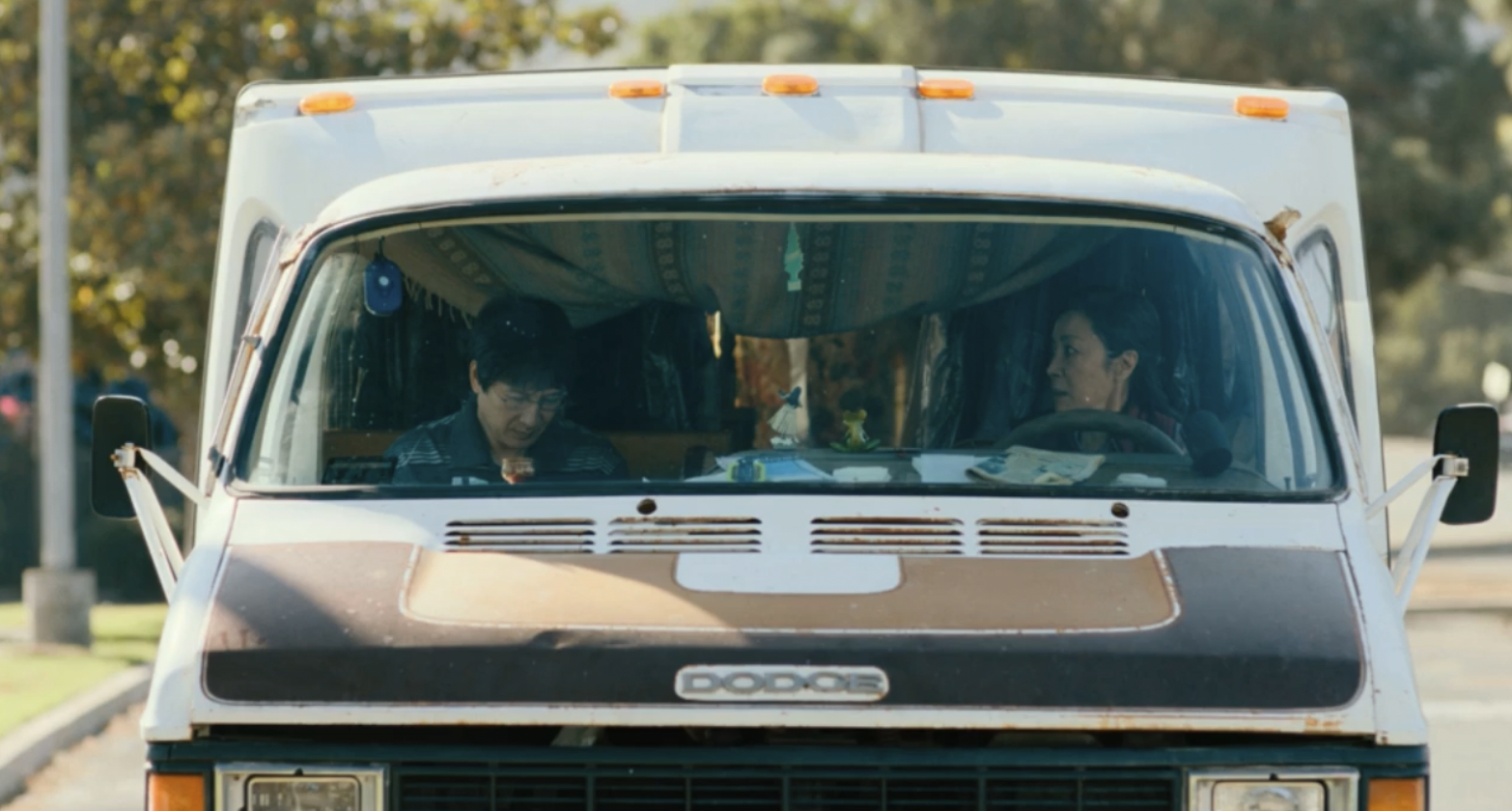
They had to act opposite doubles, Michelle had to act on green screen. I watched behind the scenes videos sometimes of big blockbusters, and they're supposed to be showing off how cool the visual effects are. But as I watch it, I just get so sad for the actors and for the crew, and just be like, "It must have been so boring on set to just shoot imaginary characters against tennis balls and green screens and that none of the actors were there together." And we had to do that for that one scene. But it's a testament to Ke and Michelle that it works emotionally. And then also our VFX artist did a great job, but it was so demoralizing to shoot this emotional scene over Zoom against green screen. While Michelle's in Europe and we're... It's like 4:00 AM andwWe're on FaceTime audio. And she's like, “What did you say? You cut out,” and we're just like...
Brutal. Brutal. Well, you couldn't tell any of that in the final film.
Kwan: Great.
Scheinert: Thank you. I agree. Yeah.
Let's talk about the visual effects of the movie. The visual effects are obviously dazzling, but you didn't use a conventional post-production VFX workflow. Daniel, you tweeted about this a little bit. Can you talk a little bit about how you worked on the VFX for this film? And my sense is, there's a lot of DIY VFX going on, like people self-taught and so on. And I guess I'm also curious, any advice for people wanting to do it themselves today?
Kwan: It all goes back to when we were in college. I had an idea and I didn't know how to pull it off. And I was like, I started YouTubing it, and I discovered After Effects and there was all these tutorials on After Effects and I was like, "Oh, this is cool." And pretty quickly, I became the After Effects guy at my school. I was teaching lessons, the school actually paid me to run the lab lessons and stuff like that. I started doing all the graphics for the local TV show art channel. And so, when we met, I was like, "I'm going to teach you how to do After Effects, you teach me how to do live action." Because he was more of a improv theater live action guy. And that collision of disciplines basically accidentally birthed our style of visual effects, which is kind of cartoony, but very raw. It feels like very homegrown, but at the same time, the ideas are so fun that it doesn't matter. And so...
Scheinert: It's a lot, like when in doubt, we like to shoot everything practically. We just don't necessarily shoot it all at the same time. And so it's like, "Oh, I'll get that ingredient, that ingredient, that ingredient, let's put them together."
Kwan: And so we started to use this for our benefits and music videos because music videos have no money, and if we can do our own visual effects, we could make the budget stretch out in a long way. And we started meeting other directors and we all started teaching each other more and more tips and tricks, and we started working with each other on our projects. One of our first big projects where we brought in a bunch of other directors to help us do the visual effects was, we did a Tenacious D video and we brought in this small team of people to basically crank out a impossible music video for a very low budget.
But because we're all friends and because we're all kind of learning with each other, it was actually really fun and exciting. And so, we've been mostly trying to recreate that process on any project we can. And in the past, when we've used bigger post houses, it's really hard for us to integrate into their system because it feels so counterintuitive to our creative process, because we like to get our hands dirty, we like to interact with the artists, and that's not how it's working out.
Scheinert: Yeah. We love to be in the room or screen share, and usually there's lots of middleman and they're also watching their clocks to see how much to charge for how many notes you give. So with this movie, long story short, we had a team of friends do over 500 visual effects, and there's like seven people. And the core team was four or five people.
And we got to have our fingerprints on it. Sometimes, instead of giving a note, we would just open up the After Effects project and tweak. And that was just such, it was so nice when you're tired of talking and writing emails. And it was also nice because we got to just spend time with our friends who were very smart and talented and they had opinions of their own.
Kwan: None of us went to school for visual effects. We all just learned everything on the internet. And you asked for advice. I don't know what is available these days, 'cause I think that the resources have only grown since we started, but Video Copilot was where I started. I don't know if that's still the most up-to-date and relevant, but I feel like Andrew Kramer, wherever you are out in the world, thank you. Thank you...
Scheinert: For doing that for free. The free lessons. Exactly. Yeah. And that's our thing, it's such a beautiful gift to the film community, these people who have been basically teaching this next generation how to make movies. I've been reflecting a lot on that lately and how we are very much a product of this time.
Daniel Scheinert: I have two more pieces of advice. One is that our ethos on this movie for most things was like, whatever the audience is looking at, do that practically. And you can get away with murder if it's the rest of the frame. 80% of the stuff on camera, no one's looking at that. That's not the story. So you can make a dangerous stunt so safe by just putting pads everywhere and it's the easiest visual effect ever. And most of our visual effects were things like that, just like, "Oh, that just made it easier to shoot."And no one's looking at that, but the raccoon is real, and the stunt is real, and the thing that breaks or explodes is real. And then...
Kwan: A lot of cleaning up.
Scheinert: A lot of cleaning up. And then the other thing is, to Dan's point, being self-taught on Google, some people don't do well in school settings/don't have the money to go to film school. But the internet is such an opportunity for people with undiagnosed or diagnosed ADHD to just follow your interests. And that can be so empowering and way to learn to make things. And there's not one way to do it. And it's like there's this free school available. Just be careful that you don't end up on the wrong websites, I guess. But the internet can be horrifying, but kind of incredible empowering too.
I have a couple more questions, but I want to take this opportunity to just talk a little bit about my reaction to the film because this might be the only chance I get. The movie profoundly affected me as it did many other people, I'm sure. I'm sure you're used to hearing about this all the time, but I think there's a few things I just wanted to tell you about it. I think that what I really love about the film is there's a scene early on in the film, when Michelle Yeoh is running to her daughter's... Catching up with her daughter whose left in a huff, and she wants to say the right thing, but she can't. She says, instead of saying a kind supportive thing, she says, "You should lose weight." Which is totally something that my mom would say during an extremely challenging moment. There's just something about the way that her brain is configured that can't say the thing that she knows she should say. And I think that's true of many Asian parents and specifically Asian moms.
And I think that what I love about the film is that, that becomes the theme of what the great evil is in the world. It is organically tied to what the main, big bad character in the movie is, is that, because expectations are so high, everything becomes meaningless and depressing. And I just really loved the way that the film executed that. Secondarily, I'll also just say that I've watched Crazy Rich Asians and Fresh Off the Boat and it's like, “Okay, these are cool.” I'm really glad that these movies and shows are great successes, but I've been curious what is the next level of representation? How can we go beyond just like, “I'm an immigrant and my lunch smelled when I was in at middle school and that was weird for me”? And I feel like this movie answers that question for me. This movie is how you take the immigrant experience and tie it into something that is epic and universal and powerful and dazzling and technically extremely competent, but also impressive. So anyway, I just wanted to share that with you personally.
Kwan: Wow, that means so much because that's really wonderful when you put a movie out and then your intention is fully received and people, people reflect it back to you. I think that for a long time I was self-conscious of the fact that I didn't believe that our story was worth putting on the screen 'cause I didn't think people would want to watch it or whatever. And this experience is showing me just how important it is, not just for the Asian American community, but for everyone.
I've been reflecting a lot about the fact that everyone is kind of pointing to the question of generational trauma and generational love that our film is trying to tackle, which is filtered through a very specifically Asian-American children of immigrants kind of narrative. But now, and it's the kind of story that can feel so small compared to what's happening in the world.
Like, “Why do we even care about this shit? The world's falling apart.” And just talking to people, I'm realizing how important it is for all of us to be showing these very small stories as universal. For instance, with the generational trauma thing, I'm realizing now, as a new parent, that the act of our generation, kind of breaking the cycle of generational trauma, can feel so small, and yet it probably is the hardest thing any of us will ever do and maybe potentially the most important thing any of us will ever do because whatever we pass down to our next generation is going to affect the way that they deal with all of the hardship and conflict and turmoil that's going to be coming at them within the next 50 years. We're at a point where, to me, I'm realizing the question of generational trauma and whether or not we break the cycle is going to be the difference, the difference between survival of the human race potentially.
[T]he act of our generation, kind of breaking the cycle of generational trauma, can feel so small, and yet it probably is the hardest thing any of us will ever do and maybe potentially the most important thing any of us will ever do.
Because if we don't raise children who are emotionally intelligent, who can see each other, who can communicate with each other through all of this noise, who aren't hung up by the traumas of their past, and instead, are able to look forward and look forward towards the possibilities, then I don't know if, I don't how well we're going to fare as a species in the next a hundred years. So to me, I'm like, this is so important. And yet it's the smallest thing that I was so ashamed of or not ashamed of, but it's the smallest thing that I felt like no one would care about.
And now that I've put out this movie, I want to take every filmmaker friend that I know and just shake them and be like, “That small thing, it's so important and you don't know why yet, but you should chase it because someone's going to need to hear it, someone's going to need to see it, and maybe it'll be become so universal that it literally changes the conversation around how we talk about it.” And so I thank you for saying all that, and I'm still processing all this, obviously, I know we're going over time now, but it's so lovely to have conversations with people like you who can just reflect things back to us as the filmmaker.
Well, I think the conclusion is, this movie is going to help to save the world. So congratulations on that.
Kwan: That's what I'm saying. Yeah.
Scheinert: We'll see. Or it might spawn like a death cult and we'll be so embarrassed. We hope that's not the case. If that's your takeaway, we don't approve.
Thank you for reading Decoding Everything. This post is public so feel free to share it.
Other Stuff David Chen Has Made Recently
On Decoding TV, Christian Spicer and I discussed the final, explosive episode of The Last of Us Season 1. Stay tuned for our bonus episode with listener feedback, plus Succession recaps coming soon!
On Decoding Reality, Justin Jordan and special guest Neebz discussed this week’s episodes of The Bachelor.
[PAID ONLY] Dave on Dave is an ongoing podcast on my personal Patreon page in which David Cho critically evaluates my online work. This week, David Cho and I discussed how hard it is to grow a podcast organically.
On The Filmcast, we reviewed Scream VI with special guest Ariel Fisher.
